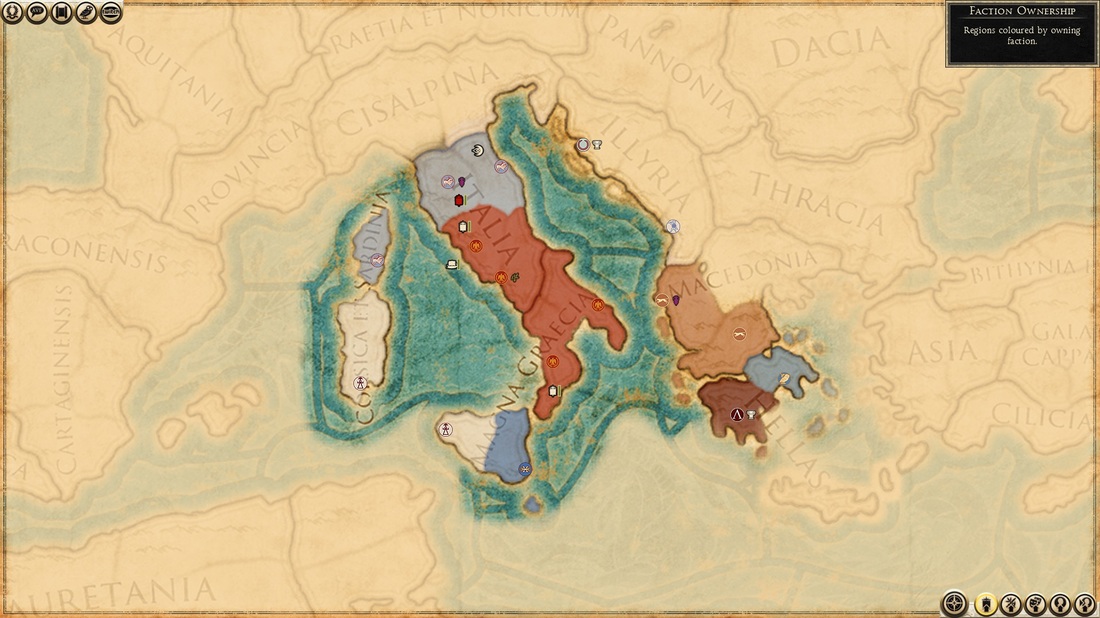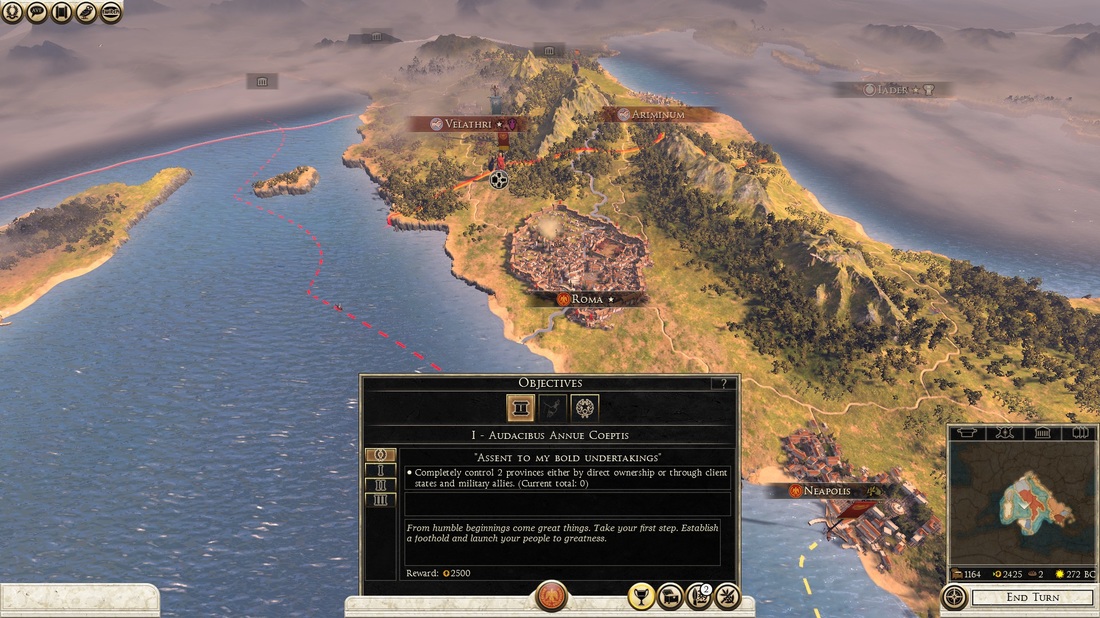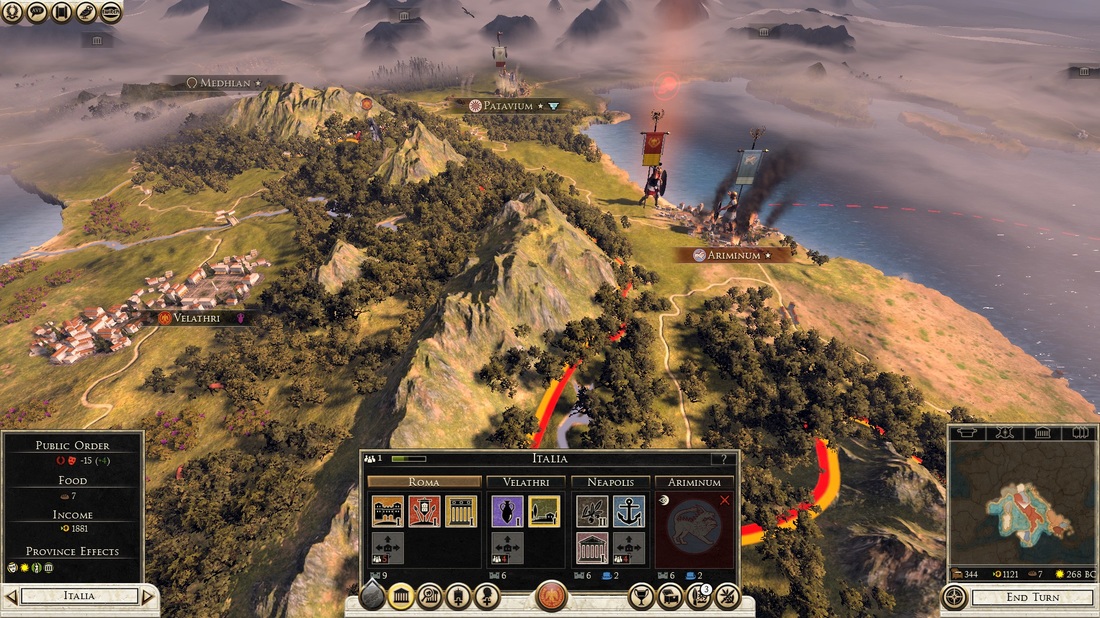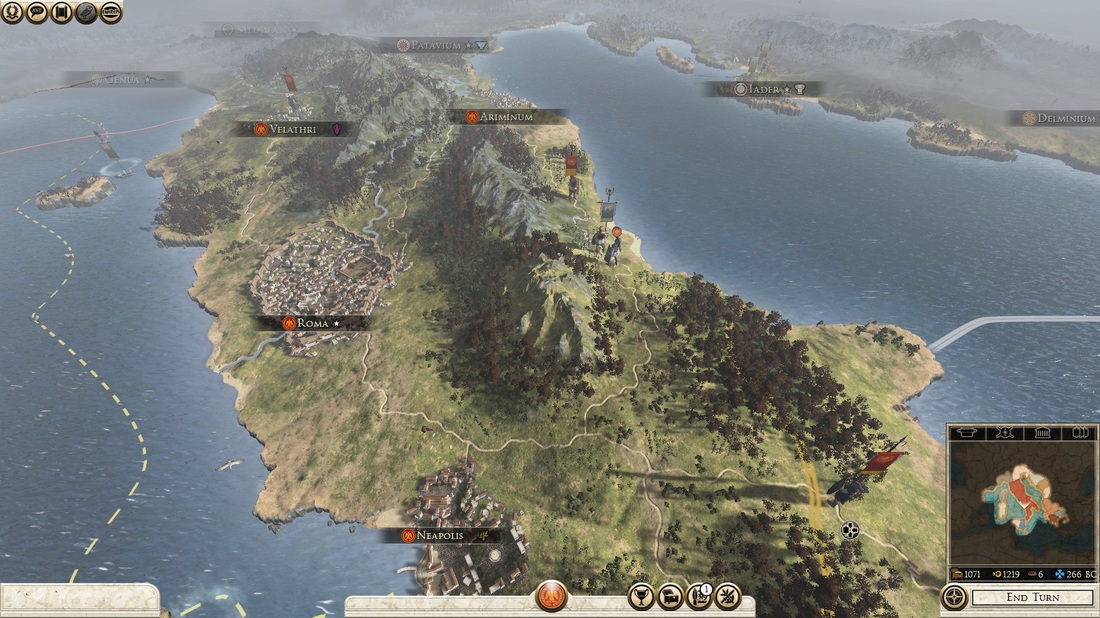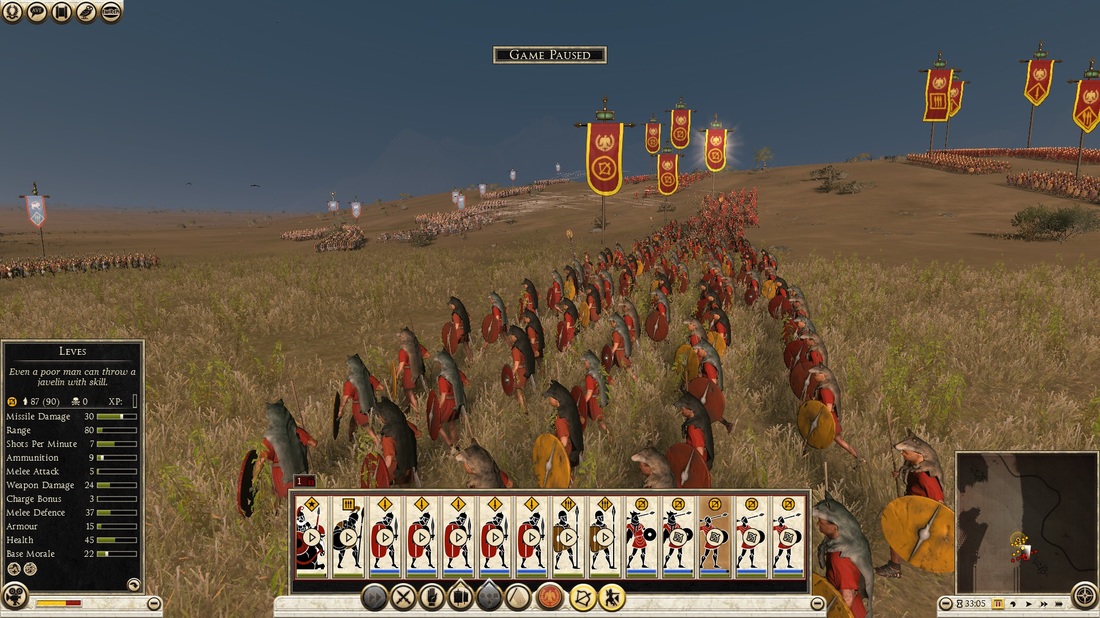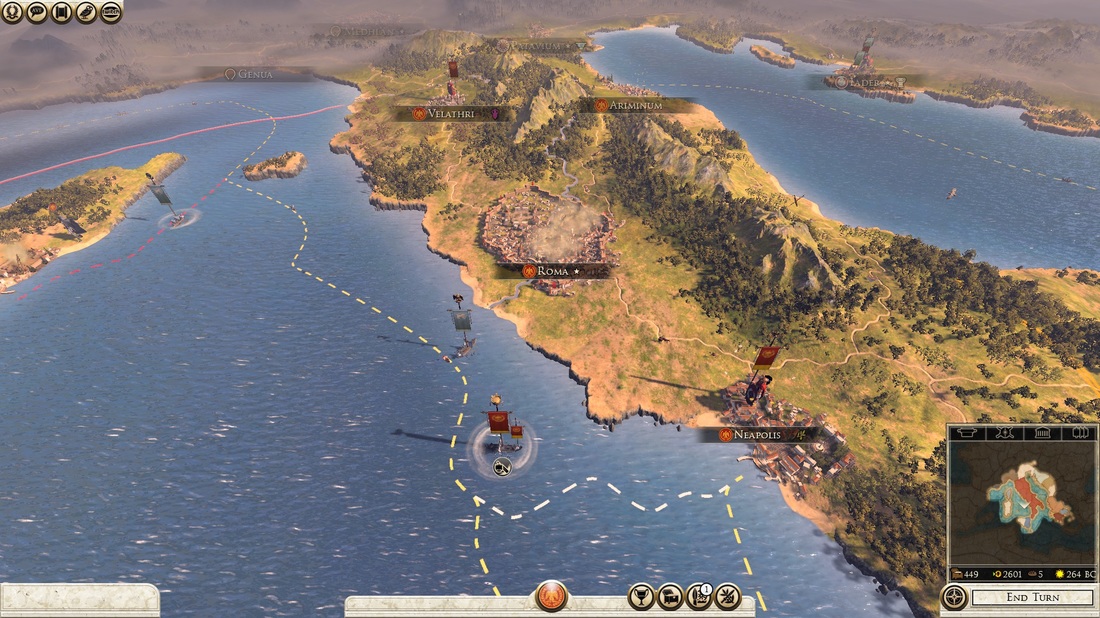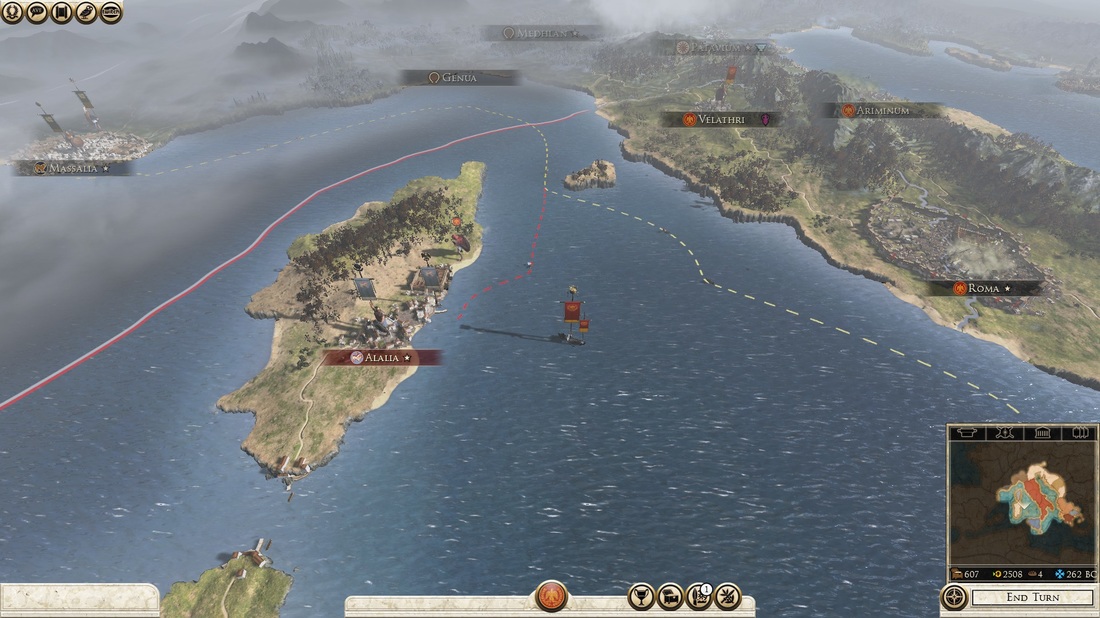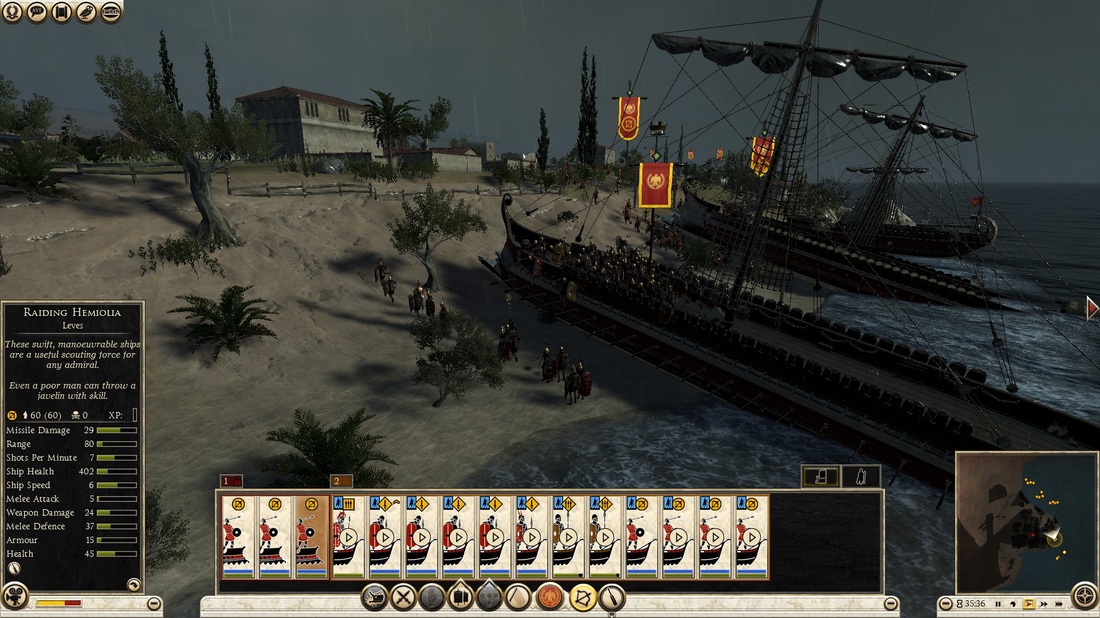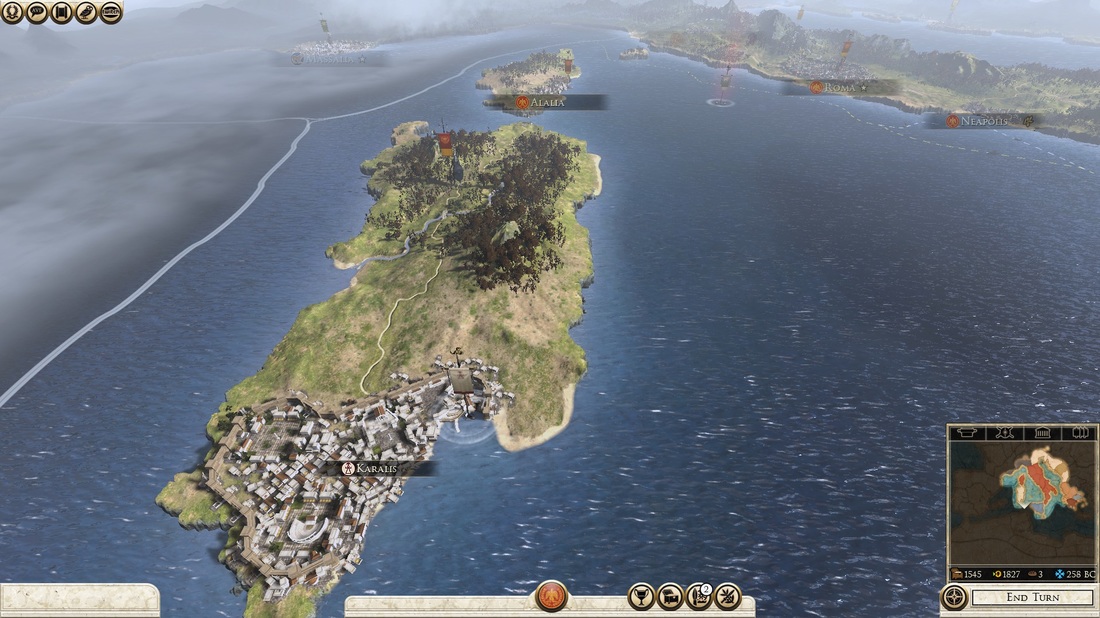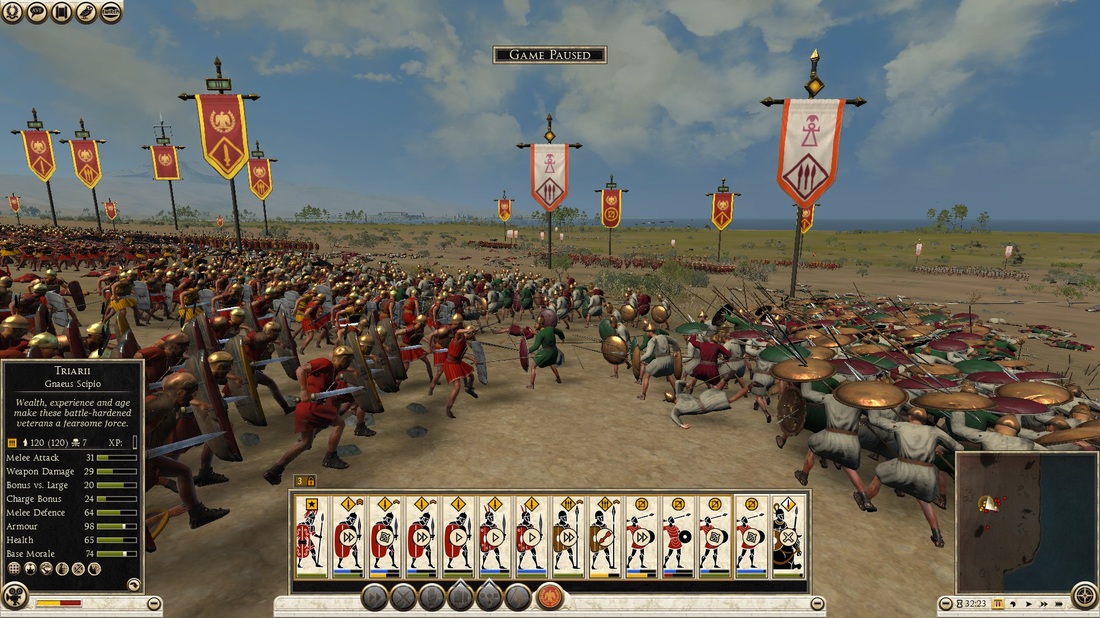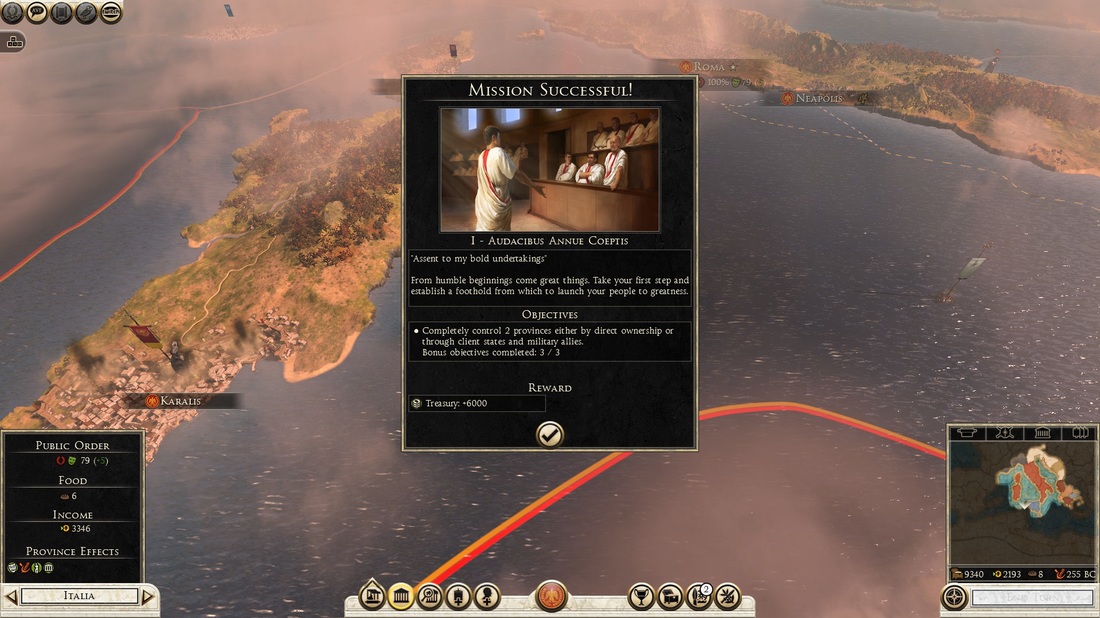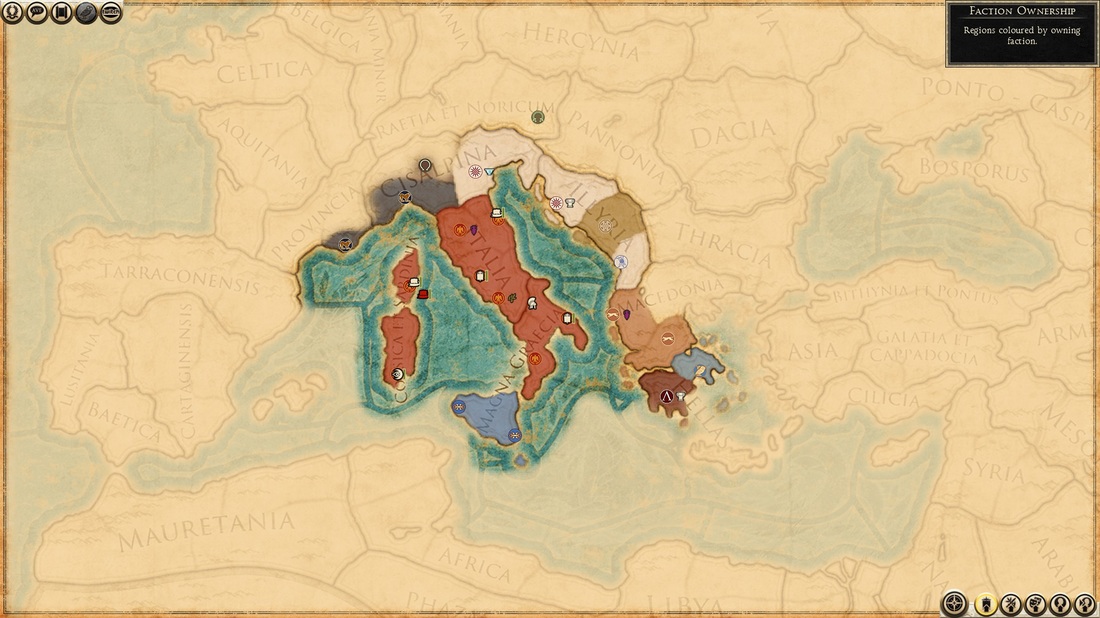Chapter I - Audacibus Annue Coeptis
|
The Senate's Demands
"Assent to My Bold Undertakings" - Completely control two provinces. |
The Senate's Ambitions
Assertion of Power - Completely control either Italia or Magna Graecia Etruscan Decline - Subjugate the Etruscan League The Punic Wars - Be at war with Carthage |
272 BC
Prologue - 272 BC, Summer – The dead were being carried back, on stretchers and in carts, to Rome and to their waiting families. Lucius Julius Libo, general of the Republic and head of the esteemed house of Julia, watched them pass and considered again what he could have done differently. As their general, he felt the weight of every corpse as it passed and could not prevent the grimace that came to his face as he read the orders in his hand.
Apparently he had been raised to military tribune. He knew the promotion was simply meant to deter him from questioning the demands that accompanied it. The senators likely envisioned him striking camp immediately, eager to prove himself worthy of his new station. Lucius Julius Libo squinted in the hot summer sun as he tried to convince himself that this action was unnecessary. His men, the men of the newly raised and armed Legio I, deserved to go home to their families. They had performed their duty when Rome was threatened and they had sent the Etruscans fleeing back to their own lands in the north. Now the Senate was commanding the Legio I to invade, and it made Julius Libo sick to think of the men he would lose trying to defeat the Etruscan League in its own lands.
On the other hand, Libo was not blind to the patterns. His father had fought in the wars against Samnium forty years ago, when the mountain tribes had attempted to assert their dominance over the growing city of Rome and her ally Lucania. Libo saw the similarities, both in cause and inevitable conclusion. Peace had only been possible when all of the Samnite and Lucanian lands had fallen under Roman providence. Now the Etruscan cities, threatened by Rome’s expanding influence, had banded together in order to raid Roman lands and threaten the city itself. Rome’s neighbors and competitors would never let her prosper in peace, and the only way to ensure Roman security would be to extend the laws of the Republic to the cities of the League. But did this cycle of conflict have an end? Would Rome achieve peace and security after this new struggle? Bitterly, Julius Libo suspected that human greed and fear might always demand the fighting be taken a step further…
Apparently he had been raised to military tribune. He knew the promotion was simply meant to deter him from questioning the demands that accompanied it. The senators likely envisioned him striking camp immediately, eager to prove himself worthy of his new station. Lucius Julius Libo squinted in the hot summer sun as he tried to convince himself that this action was unnecessary. His men, the men of the newly raised and armed Legio I, deserved to go home to their families. They had performed their duty when Rome was threatened and they had sent the Etruscans fleeing back to their own lands in the north. Now the Senate was commanding the Legio I to invade, and it made Julius Libo sick to think of the men he would lose trying to defeat the Etruscan League in its own lands.
On the other hand, Libo was not blind to the patterns. His father had fought in the wars against Samnium forty years ago, when the mountain tribes had attempted to assert their dominance over the growing city of Rome and her ally Lucania. Libo saw the similarities, both in cause and inevitable conclusion. Peace had only been possible when all of the Samnite and Lucanian lands had fallen under Roman providence. Now the Etruscan cities, threatened by Rome’s expanding influence, had banded together in order to raid Roman lands and threaten the city itself. Rome’s neighbors and competitors would never let her prosper in peace, and the only way to ensure Roman security would be to extend the laws of the Republic to the cities of the League. But did this cycle of conflict have an end? Would Rome achieve peace and security after this new struggle? Bitterly, Julius Libo suspected that human greed and fear might always demand the fighting be taken a step further…
Autumn 271 BC – The army Rome had raised to defend its borders was not strong enough for Julius Libo to take the fight to the Etruscans, and so he had begun recruiting immediately. By the Autumn of 271 BC, Libo had assembled the largest army under a Roman banner since the wars with Samnium. With a core of disciplined Roman hastati and javelin-armed skirmishers, Libo supplemented his army with Etruscan mercenaries who were willing to fight against the League and who were trained in spear tactics designed to defend against the heavy cavalry of their nobles. Libo marched his army north to find that the League had retreated ahead of him. At Velathri, he swept aside a brave but ill-prepared resistance organized by the local nobles, and occupied the city with hopes of forcing the Etruscans to go on the offensive.
Winter 270 BC – The next year passed without either side committing to a decisive engagement. As they wintered in the city of Velathri, the army was buzzing with the political debates taking place back home. While the voices in the Senate were far from unanimous, they had successfully rallied the populace behind the idea that Rome needed to significantly extend its rule in order to maintain its own security.
Most factions agreed that the threat of the Etruscan League was greatest and that they must be subject to Roman law as the other Latin tribes have been, but the fear-mongers had other ammunition as well. Voices from the Great Families were calling for the Romans to claim undisputed hegemony over the entire regions of Italia and Magna Graecia, reminding the people that their trade partners in Syracuse had allied with King Pyrrhus during his invasion of Roman lands. They pointed out that Greek king has raised another great army across the Adriatic while failing to mention that this army was already engaged in a full-scale war against the states of Athens and Sparta. Meanwhile, orators from the Cornelii family argued publically that the true threat to Rome was the expanding influence of Carthage, the great city of seafarers in Africa. As Libo prepared his army for the march north, his counterpart and rival, Gnaeus Cornelius Scipio Asina, raised forces at Cosentia in the South with the obvious expectation of conflict with the Carthaginians or another invasion from Greece. Although Julius Libo held onto hope that the diplomatic agreements the Romans had with Carthage and Syracuse would weather the storm, he felt that the political climate in the city boded ill for the relationship.
Most factions agreed that the threat of the Etruscan League was greatest and that they must be subject to Roman law as the other Latin tribes have been, but the fear-mongers had other ammunition as well. Voices from the Great Families were calling for the Romans to claim undisputed hegemony over the entire regions of Italia and Magna Graecia, reminding the people that their trade partners in Syracuse had allied with King Pyrrhus during his invasion of Roman lands. They pointed out that Greek king has raised another great army across the Adriatic while failing to mention that this army was already engaged in a full-scale war against the states of Athens and Sparta. Meanwhile, orators from the Cornelii family argued publically that the true threat to Rome was the expanding influence of Carthage, the great city of seafarers in Africa. As Libo prepared his army for the march north, his counterpart and rival, Gnaeus Cornelius Scipio Asina, raised forces at Cosentia in the South with the obvious expectation of conflict with the Carthaginians or another invasion from Greece. Although Julius Libo held onto hope that the diplomatic agreements the Romans had with Carthage and Syracuse would weather the storm, he felt that the political climate in the city boded ill for the relationship.
Spring 269 BC – As Spring arrives, the I Legion again took the offensive against the Etruscans. After helping to found a new legion in Velathri that would hopefully intercept any counterattacks launched towards the occupied town or Rome, Libo took his army into the northern pass around the mountains of central Italia. He hoped to encircle the Etruscan army in Ariminum.
Summer 268 BC – In their position. Julius Libo would have choosen to avoid a pitched battle and instead threatened Rome itself. He considered himself fortunate that the Etruscan leaders decided not to abandon Ariminum. However, when his scouts reported the number of the city’s defenders, Libo reconsidered his luck. He would not be able to assault the city, and encircled the town instead.
The Etruscans would soon have to attack his position or watch the army they had pulled together starve and desert. Libo believed his army would outperform the Etruscans in the field, and he liked his chances of crushing their main force in the inevitable battle.
The Etruscans would soon have to attack his position or watch the army they had pulled together starve and desert. Libo believed his army would outperform the Etruscans in the field, and he liked his chances of crushing their main force in the inevitable battle.
Autumn 267 BC – The Etruscan army, who called themselves the Thunderbolts of the Nine, and their leader Aurelius Traianus, took to the sea to avoid facing the I Legion. Julius Libo quickly occupied Ariminum, seizing the Etruscans last stronghold in Italia, but taking the town prevented Libo from pursuing Traianus. Sensing a chance for glory, Cornelius Scipio Asina led the IV Legion north in an attempt to stop the Thunderbolts wherever they chose to come ashore.
Winter 266 BC – As Rome slowly learned of events in greater Italia, panic swept through the city and nearby villages. Libo and the other generals received immediate requests from the Senate to hunt down the Thunderbolts of the Nine, at all costs, and eliminate this threat before it reached Rome. Meanwhile, scouts reported to Libo that a smaller Etruscan army, sent from Corsica, was preparing to land near Velathri.
Julius Libo trusted that the V Legion could handle the defense of Velathri, and so he marched after Traianus and the Thunderbolts. As they passed through Italia, the thunder bolts were slowed by assaults on their patrols that sapped their strength and increased their caution. Led by the Roman veteran and champion, Faustus Labienus Laenus, these distractions would hopefully allow Julius Libo to catch the Thunderbolts before they slipped away again.
Julius Libo trusted that the V Legion could handle the defense of Velathri, and so he marched after Traianus and the Thunderbolts. As they passed through Italia, the thunder bolts were slowed by assaults on their patrols that sapped their strength and increased their caution. Led by the Roman veteran and champion, Faustus Labienus Laenus, these distractions would hopefully allow Julius Libo to catch the Thunderbolts before they slipped away again.
Spring 265 BC – He caught up to Traianus in the lands of Rome’s previous rival, Samnium. With roughly equivalent heavy infantry cores, his opponent’s lack of skirmishers allowed Julius Libo to control the battlefield and surround his enemy. After decisively crushing the Thunderbolts, the I Legion continued on to Neapolis where Libo planned to take ship and invade Corsica. His colleague, Decimus Junius Brutus of the Junii, was already in port and attempting to bolster the meagre Roman fleet.
Summer 264 BC – Lucius Julius Libo was quickly becoming the people’s hero in Rome, and the Julii family was dominating the Senate chambers. When he was informed that his family had secured an appointment to the office of Quaestor for him, he cursed their lack of foresight. The I Legion was ordered to return to Rome to ensure its defense and allow the new Quaester to attend his administrative duties, and Libo was obligated to suspend his pursuit. The IV Legion, under Cornelius Scipio Asina arrived in Neapolis to take up the reigns, and set sail with the hastily constructed III Fleet.
Autumn 263 BC – As the Roman and Etruscan League’s fleets danced around each other, giving the League time to mount a defense on Corsica, Rome’s other neighbors did not sit quietly. King Pyrrhus continued his bloody war against Sparta, with neither side making permanent gains, and the Greeks of Syracuse had declared war on Carthage, seizing their land in Sicily. When the diplomats of Syracuse approached Rome with a mutual non-aggression pact, the Roman politicians debated if Syracuse’s success would make them a greater threat than the Africans. While the Senate turned the diplomats away disappointed, they maintained trade and neutral relations with the Greeks. The city-states of Syracuse to the south and Massilia to the north were Rome’s most lucrative trade partners, and gold kept attitudes optimistic. With the region of Italia firmly under Rome's auspices, an edict for Commercial Stimulation was issued to further consolidate the city's income.
Winter 262 BC – Italia prospered under united Roman rule and the people benefited from infrastructural and agricultural improvements that further solidified the city's role as protector and provider.
Spring 261 BC – Having received word that the Hammers of Sethlans, the Etruscan defenders of Corsica, had departed the island in order to attack Italia, Junius Brutus sailed his fleet into the harbor of Alalia. Fearing the Hammers could return at any time, Brutus and Cornelius Scipio Asina agreed to immediately invade the town. The resulting amphibious assault against the town’s brave defenders was bloody but successful. With the IV Legion occupying the final resource base of the League, the Romans waited to see how the desperate Etruscan armies would react.
Summer 260 BC – After making landfall in Alalia, Cornelius Scipio Asina set to the long task of integrating the formerly Etruscan domain into the Roman realm. Already Scipio Asina noticed that the influence from Carthaginian Sardinia was going to make it difficult for Rome to exert its authority over Corsica. Meanwhile, Junius Brutus pursued and destroyed remnants of the Etruscan fleet near the islands.
Autumn 259 BC – Deprived of all political power, the Etruscan League continued to plague the Roman trade routes and stir rebellion among Rome’s new Etruscan citizens. Despite this continuing threat, the Cornelii family convinced the Senate to nullify Rome’s treaties with Carthage. Cornelius Scipio Asina saw the war between Syracuse and Carthage as the perfect opportunity to stymy the Africans’ rise to power and cement the glory of the Cornelii family.
Winter 258 BC – Cornelius Scipio Asina led the IV Legion into Sardinia with the Carthaginian city of Karalis as its target. Despite the lack of a formal declaration of war, the Africans could not mistake his intent. Scipio Asina hoped they would be too distracted fighting in Magna Graecia to prepare a formidable defense.
Spring 257 BC– While the IV Legion began constructing ladders and galleries in preparation for an assault on Karalis, Scipio Asina was unable to blockade the city and prevent the arrival or reinforcements. Even if the Carthaginian navy had not outmatched any commanded by the Romans, what ships the Roman’s commanded were engaged with Etruscan pirates. North of Italia, the Romans took notice of the subjugation of the neighboring Celtic tribe of Liguria by the city-state of Massilia.
Summer 256 BC – After the arrival of reinforcements, the commander of Karalis decided to break the siege of his city. Though he outnumbered the Romans, his mix of mercenaries and levies were insufficiently outfitted and trained and Cornelius Scipio Asina was able to adequately defend his position. Scipio Asina lost a full third of the IV Legion’s strength but the Carthaginian garrison was devastated. The IV Legion was able to move into the city before the end of the year, looting and pillaging. Scipio Asina, recognizing the value of a military wharf so close to the city of Carthage itself, utilized much of the plunder to guide reconstruction in the city towards Roman aspirations. The edict for Commercial Stimulation was temporarily lifted in Italia in order to fund celebratory Bread and Games in Corsica and Sardinia. It was hoped that the display of wealth and culture would ease the transition of authority in the islands.
The Roman Republic had now doubled in size since Julius Libo was sent to invade the lands of Etruria, 15 years ago. Through their part in this achievement, the Julii family was the dominant force in the Senate and the de facto leaders of the Republic, but Rome's other families had, with the Cornelii and Junii foremost, proven their value and would not be held in the shadows. How the Romans, and the Julii, would decide to use their newfound prominence was sure to shape all future politics in the Mediterranean.
|
The Senate's Demands
"Assent to My Bold Undertakings" - Completely control two provinces. (Complete) |
The Senate's Ambitions
Assertion of Power - Completely control either Italia or Magna Graecia (Complete) Etruscan Decline - Subjugate the Etruscan League (Complete) The Punic Wars - Be at war with Carthage (Complete) |
256 BC
